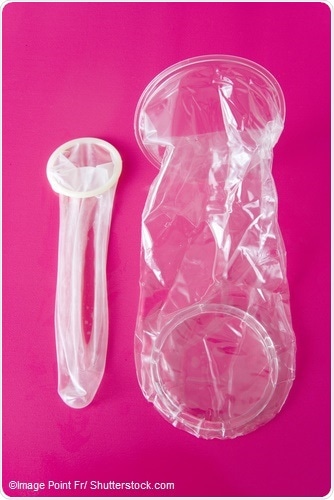Condoms are essentially a barrier method of contraception. The concept is that if the sperm can be prevented from entering the uterus, it will not be able to fertilize the egg leading to protection against pregnancy. Both male and female condoms are available in the market. They are to be thrown away after a single use. Here we explore the differences between them.
The male condom
 The male condom is used over the man’s erect penis. It may be made of latex, polyurethane or polyisoprene. For those allergic to latex, there are specialized condoms made out of lambskin available. The male condom has the distinction of being the most common contraceptive used by couples worldwide.
The male condom is used over the man’s erect penis. It may be made of latex, polyurethane or polyisoprene. For those allergic to latex, there are specialized condoms made out of lambskin available. The male condom has the distinction of being the most common contraceptive used by couples worldwide.
In addition to providing protection from conception, the male condom is also able to shield the user from sexually transmitted infections such as HIV, chlamydia and gonorrhoea. This is especially useful for those having sexual intercourse with multiple partners.
The female condom
The female condom is pushed inside the vagina as a lining or a artificial pocket. It is made of polyurethane or nitrile polymer which is a synthetic rubber. It looks like a lubricated pouch with two ends, one of which is open and the other closed. Both the ends have flexible stiff rings at the ends which help to keep the female condom in place after insertion.
While it is believed that female condoms may also provide protection against sexually transmitted infections, it is not as effective as the male condom as some body fluids may be exchanged. Inserting the female condom properly into the vagina needs to be practised so that it is placed correctly. Also the shifting of the pouch of the female condom during sexual intercourse is considered to be normal.
Which is more effective?
There are many contraception methods that a couple in a sexual relationship may choose to use. However, for quick contraception the condoms appear to be the fastest-acting choice. When used properly, both male and female condoms are highly effective in preventing an unwanted pregnancy.
No contraception method is 100% effective, but condoms do tend to do a good job on the whole. There is a 21% chance of becoming pregnant while using the female condom. This is considerably higher than the 14% chance of pregnancy while using a male condom. You can only use one of the condoms at a time. Male and female condoms cannot be used together. However, other contraceptives such as spermicides or the oral contraceptive pill can be used with either the male or the female condom.
However, there are instances when the condoms tear or rupture during sexual intercourse, which may lead to accidental pregnancy. The barrier method, in general, has a 12 to 28% failure rate as per the National Institutes of Health. This includes the use of contraceptive sponges, diaphragms and cervical caps as well as condoms.
The male condom is more effective than the female condom at preventing pregnancy. This is probably because it is easier to place on the erect penis rather than inserting a female condom into the vagina and ensuring that the inner ring hits the cervix.
Disadvantages of using condoms
Some condom users, though by no means all, report that using this method of conception can reduce the sensitivity of the genital organs and inhibit pleasure during sexual intercourse.
Condoms cannot be used for spontaneous sexual intercourse. The person must disengage from the partner to put on the condom once intercourse is about to take place.
No condom is fool proof. Incorrect usage or rupture during use can result in failure of the barrier contraceptive method.
People allergic to latex are unable to use regular condoms. The lambskin or polyurethane condoms are more expensive, but may be used in place of regular condoms.
The female condom may be pushed inside the vagina during sexual intercourse. This will also cause the condom to lose some efficiency in preventing pregnancy.
The rings of the female condom have been known to cause irritation inside the vagina, as well as to the male penis. This may be remedied with the use of extra lubrication. If irritation persists, the user should check for an allergic reaction.
Advantages of using condoms
Using condoms perfectly is the best way to avoid getting a sexually transmitted infection. Of course the one method that works all the time is abstinence!
Condoms can be easily bought at regular grocery stores and do not require a prescription like some other conception methods do. This makes them readily accessible to many people.
The female condom has the advantage of staying in place even after sexual intercourse, unlike male condoms which may slide off when the male loses his erection. This means that there is no accidental spilling of sperm inside the vagina, unlike what happens when the male condoms slides off the penis while the male organ is still inside the vagina.
The use of condoms allows both male and female partners to take responsibility for avoiding unwanted pregnancy in a simple manner.
References
- https://www.dred.com/uk/types-of-contraceptives.html
- https://www.nichd.nih.gov/health/topics/contraception/conditioninfo/Pages/types.aspx
- https://www.fpa.org.uk/
- http://www.pamf.org/teen/sex/birthcontrol/condom.html
- http://www.pamf.org/teen/sex/birthcontrol/femalecondom.html
Further Reading
Last Updated: Dec 21, 2022